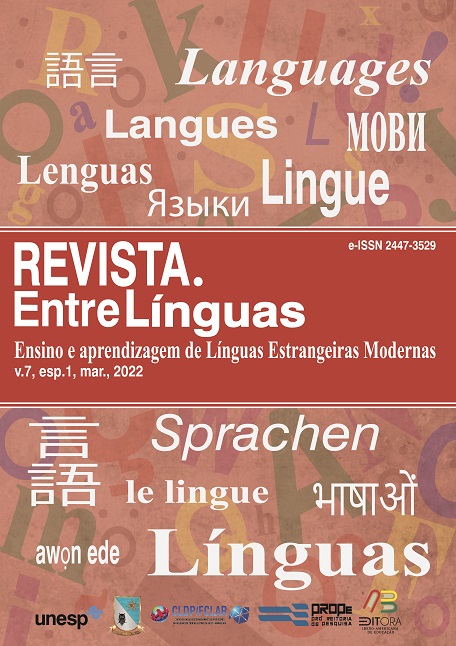Aspectos de la traducción de textos científicos y técnicos del inglés al ruso para especialistas con educación técnica
DOI:
https://doi.org/10.29051/el.v8iesp.1.16933Palabras clave:
Saturación terminológica, Modelo de formación de palabras, Construcciones atributivas no complicadas, AbreviaturaResumen
Este artículo analiza diversas dificultades que suelen encontrar los especialistas con formación técnica a la hora de traducir textos científico-técnicos. Y aunque el propósito de cualquier traducción es transmitir el contenido de cualquier texto con la mayor precisión posible, sin embargo, no se deben olvidar las peculiaridades de traducir textos científicos y técnicos. En la mayoría de los textos científicos y técnicos en inglés hay una gran cantidad de términos técnicos, y muchos más que en los idiomas europeos. Por lo tanto, al traducir este tipo de textos, es necesario tener en cuenta sus especificidades y, en consecuencia, seleccionar de manera competente los medios para la traducción más precisa del contenido de dichos textos, preservando sus aspectos léxicos, gramaticales y sustantivos.
Descargas
Citas
ANIKEEVA, I. G. Formation of readiness of students of the Faculty of Foreign Languages for translation activities. 2006. Thesis (Candidate of Pedagogical Sciences) – Samara University, Russia, 2006. Available in: http://repo.ssau.ru/handle/Avtoreferaty/Formirovanie-gotovnosti-studentov-fakulteta-inostrannyh-yazykov-k-perevodcheskoi-deyatelnosti-Elektronnyi-resurs-avtoreferat-kand-ped-nauk-130008-zashishena-220606-66777?mode=full. Access in: 12 Feb. 2021.
CHERNOVETS, I. E. The main trends of term formation in the English language. Minsk: BSU, 2018.
KONYAEVA, L. A. On some difficulties of scientific and technical translation. Translation and Comparative Linguistics, n. 11, p. 50-54, 2015. Available in: https://cyberleninka.ru/article/n/o-nekotoryh-trudnostyah-nauchno-tehnicheskogo-perevoda/viewer. Access in: 27 June 2021.
KOROTKINA, I. V. Teaching academic English with the help of word formation. Higher education in Russia, v. 28, n. 2, p. 94-103, 2019. Available in: https://elibrary.ru/item.asp?id=37026035. Acceso in: 25 June 2021.
MIKHEEVA, S. V. Features of the translation of professionalism on the example of the works of Arthur Haley. Kazan: Young scientist, 2018.
SALIEVA, S. M. On the question of the types of active word formation in modern English. Tashkent: Uzbek State University of World Languages, 2019.
SHEVCHUK, V. N. Derived military terms in the English language: Affixal word production. Moscow: Voenizdat, 1983.
SUDOVTSEV, V. A. Scientific and technical information and translation. Moscow: Higher School, 1989.
TATARINOV, V. A. Theory of Terminology. Moscow: Moscow Lyceum, 1996.
USHAKOVA, A. O. Specifics of technical translation. Bulletin of PNRPU Problems of Linguistics and Pedagogy, n. 4, p. 18-26, 2017. Available in: https://cyberleninka.ru/article/n/spetsifika-tehnicheskogo-perevoda/viewer. Access in: 16 June 2021.
YABLOKOVA, M. V. Conversion as an active way of word formation in modern English. Yaroslavl Pedagogical Bulletin, v. 1, n. 1, p. 197-201, 2012. Available in: http://vestnik.yspu.org/releases/2012_1g/44.pdf. Access in: 05 July 2021.
YUDINA, I. I. Structural features of attributive phrases and ways of their translation. Moscow: Publishing house Nauka, 1981.
YUSUPOVA, SH. B. Some difficulties in translating English technical terms. Young scientist, v. 4, n. 84, p. 808-811, 2015. Available in: https://moluch.ru/archive/84/15431/. Access in: 23 Aug. 2021.
Publicado
Cómo citar
Número
Sección
Licencia

Esta obra está bajo una licencia internacional Creative Commons Atribución-NoComercial-CompartirIgual 4.0.
Os manuscritos aceitos e publicados são de propriedade da Revista EntreLínguas. Os artigos publicados e as referências citadas na Revista EntreLínguas são de inteira responsabilidade de seus autores.
Transferência de direitos autorais – autorização para publicação
Caso o artigo submetido seja aprovado para publicação, já fica acordado que o(s) autor(es) autoriza(m) a UNESP a reproduzi-lo e publicá-lo na EntreLínguas, entendendo-se os termos “reprodução” e “publicação” conforme definição respectivamente dos incisos VI e I do artigo 5° da Lei 9610/98. O artigo poderá ser acessado pela rede mundial de computadores (Internet), sendo permitidas, a título gratuito, a consulta e a reprodução de exemplar do artigo para uso próprio de quem a consulta, desde que haja a citação ao texto consultado. Essa autorização de publicação 328 EntreLínguas, Araraquara, v. 1, n .2, p. 323-328, jul./dez. 2015 não tem limitação de tempo, ficando a UNESP responsável pela manutenção da identificação do(s) autor(es) do artigo. Os artigos publicados e as referências citadas na Revista EntreLínguas são de inteira responsabilidade de seus autores.











